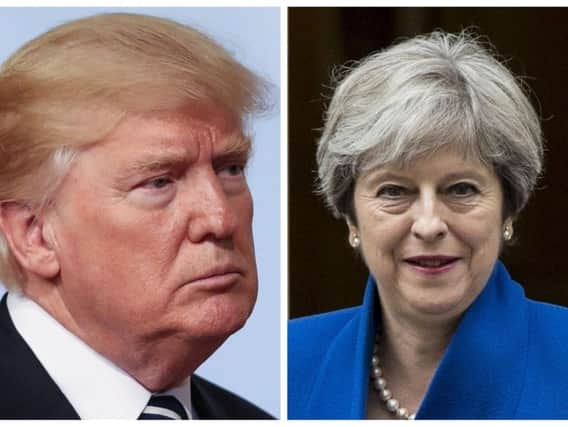President Donald Trump pulls out of Iran nuclear deal... but what does that mean for Britain and our safety?


Firefighters rescue woman from river in LeedsThe US president said he would impose the "highest level" of economic sanctions on Iran as he claimed the state was on the brink of acquiring nuclear weapons.
Tehran immediately responded by warning it would begin enriching more uranium than ever if negotiations with other countries in the pact failed.
Advertisement
Hide AdAdvertisement
Hide AdPresident Hassan Rouhani said he would send foreign minister Mohammad Javad Zarif to visit each of the remaining countries involved in the deal.
Risk of 'further very warm weather' for Leeds, according to Met OfficeFormer president Barack Obama said the decision was a "serious mistake" that could leave the US facing "a losing choice between a nuclear-armed Iran or another war in the Middle East".
In a joint statement, Theresa May May, German chancellor Angela Merkel and French president Emmanuel Macron said the decision was a matter of "regret and concern".
But Israeli prime minister Benjamin Netanyahu hailed Mr Trump for the "bold" move and described the agreement as a "recipe for disaster" that had brought the prospect of war closer.
Advertisement
Hide AdAdvertisement
Hide AdBritain, France and Germany had made strenuous attempts to persuade the US president to preserve the deal.
YEP Leeds Italian of the Year: Shortlist revealedOn Monday, Boris Johnson made a diplomatic dash to Washington in a last-ditch push to win over the president. The visit came soon after Mrs Merkel and Mr Macron made direct appeals to Mr Trump in face-to-face talks.
But the diplomatic efforts failed to secure even a delay in the announcement.
Speaking in the White House, Mr Trump said the agreement was "disastrous" and a "great embarrassment" to him.
Advertisement
Hide AdAdvertisement
Hide Ad"The Iran deal is defective at its core," he said. "If we do nothing, we know exactly what will happen.
"In just a short period of time, the world's leading state sponsor of terror will be on the cusp of acquiring the world's most dangerous weapon.
"Therefore, I am announcing today that the United States will withdraw from the Iran nuclear deal."
Mr Trump said the move was a sign that the US "no longer makes empty threats".
"When I make promises, I keep them," he said.
Advertisement
Hide AdAdvertisement
Hide AdIn a joint statement, Mrs May, Mrs Merkel and Mr Macron said they remained committed to the deal.
Here we look at the background to the controversial decision:
What is the Iran nuclear deal?
Iran agreed to rein in its nuclear programme in a 2015 deal struck with the US, UK, Russia, China, France and Germany.
Under the Joint Comprehensive Plan of Action (JCPoA) Tehran agreed to significantly cut its stores of centrifuges, enriched uranium and heavy-water, all key components for nuclear weapons.
Why did Iran agree to the deal?
Advertisement
Hide AdAdvertisement
Hide AdIt had been hit with devastating economic sanctions by the United Nations, United States and the European Union that are estimated to have cost it tens of billions of pounds a year in lost oil export revenues. Billions in overseas assets had also been frozen.
Why is it under threat?
The deal was the key foreign policy achievement of Barack Obama's presidency, making it an immediate target for his successor Donald Trump.
On the presidential campaign trail Mr Trump made his opposition clear and then continued to make threats about pulling out of the "worst" deal the US has "ever" signed up to because of its "disastrous flaws".
In his White House statement on Tuesday, he said the agreement was one-sided and so poorly negotiated that Iran could still be on the brink of acquiring a nuclear weapon even if it fully agreed with the terms.
Advertisement
Hide AdAdvertisement
Hide AdMr Trump claimed there would be a nuclear arms race in the Middle East if he allowed it to stand.
What is Britain's position?
The Government does admit the deal is not perfect as it fails to cover areas such as ballistic missiles and is time-limited, but insists it is the option with the "fewest disadvantages".
Germany, France and the United Nations all urged the US not to withdraw, with Foreign Secretary Boris Johnson making a last-ditch attempt to preserve the deal during a trip to Washington on Monday.
After Mr Trump revealed his plans, Prime Minister Theresa May issued a joint statement with Angela Merkel and Emmanuel Macron saying the decision was a matter of "regret and concern".
What happens now the United States has pulled out?
Advertisement
Hide AdAdvertisement
Hide AdPresident Trump said he will impose the "highest level" of economic sanctions on Iran.
Tehran warned before the announcement that US withdrawal from the agreement effectively amounts to "killing the deal".
Immediately after Mr Trump set out his decision, Iranian President Hassan Rouhani warned the country could start enriching uranium more than ever if negotiations with other countries in the deal failed.
Britain, Germany and France said they remained committed to the accord and encouraged Iran to "show restraint" in response to the decision by the US.
Has there been any support for the move?
Advertisement
Hide AdAdvertisement
Hide AdIsraeli Prime Minister Benjamin Netanyahu said the deal had fuelled Iranian aggression in the region.
He praised Mr Trump's "historic" decision and insisted leaving the accord in place would be "a disaster for the peace of the world".